广东省深圳市 Module 1 Unit 1 Making friends 课件
文档属性
| 名称 | 广东省深圳市 Module 1 Unit 1 Making friends 课件 |
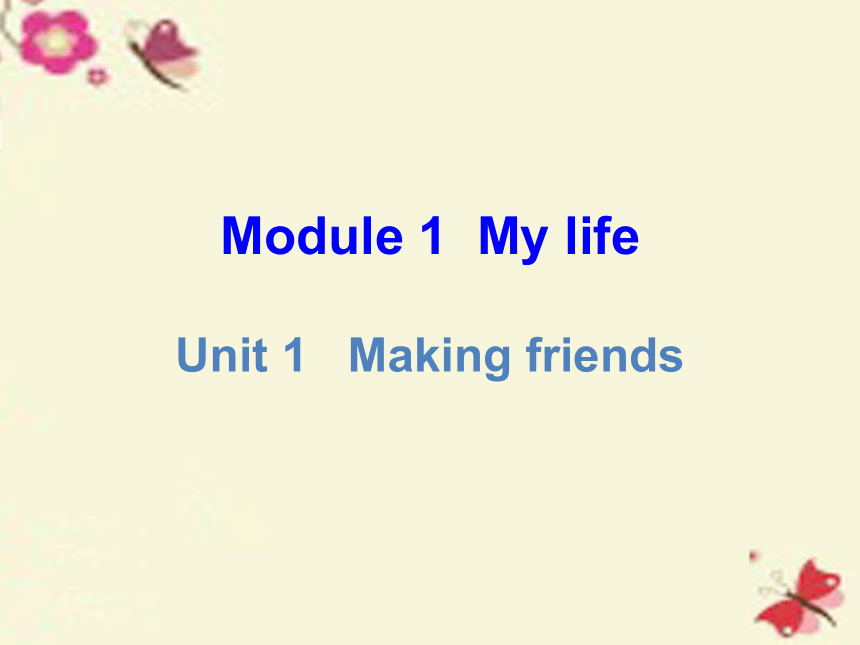
|
|
| 格式 | zip | ||
| 文件大小 | 112.9KB | ||
| 资源类型 | 教案 | ||
| 版本资源 | 牛津深圳版 | ||
| 科目 | 英语 | ||
| 更新时间 | 2016-12-13 00:00:00 | ||
图片预览

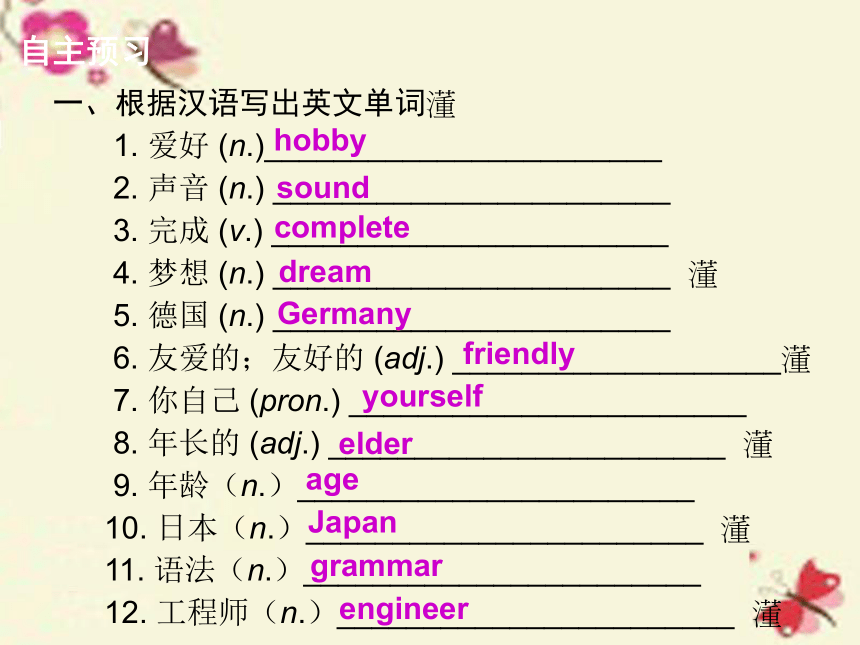
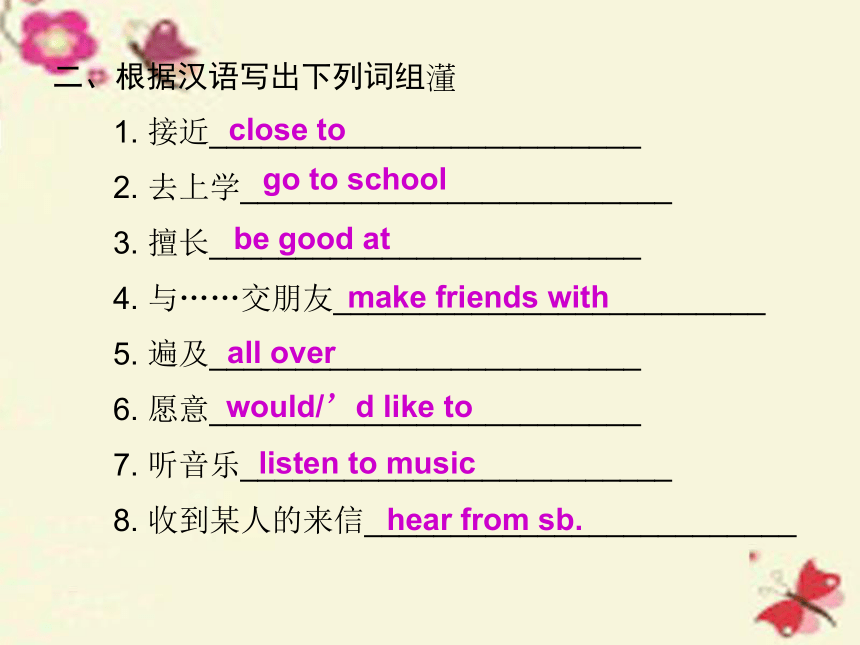
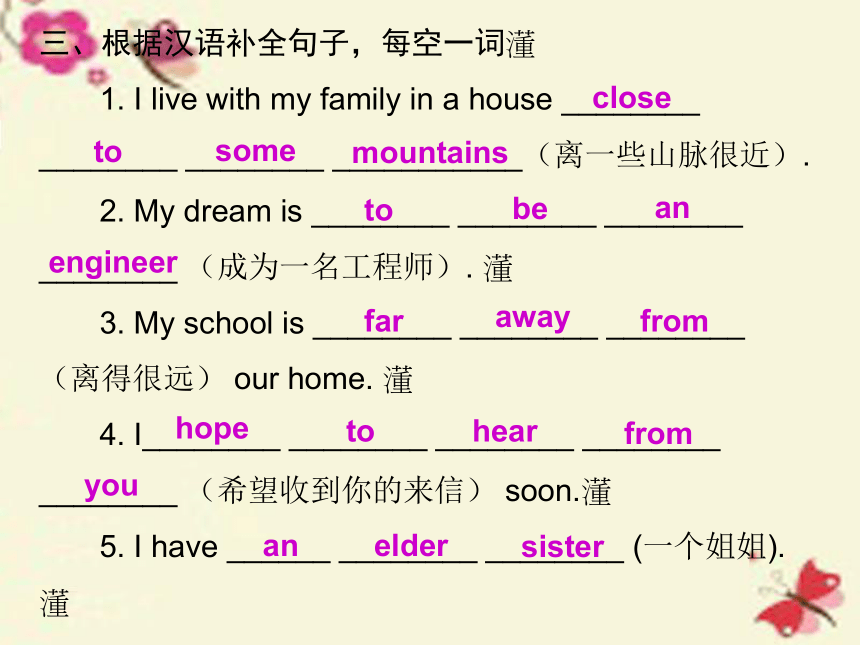
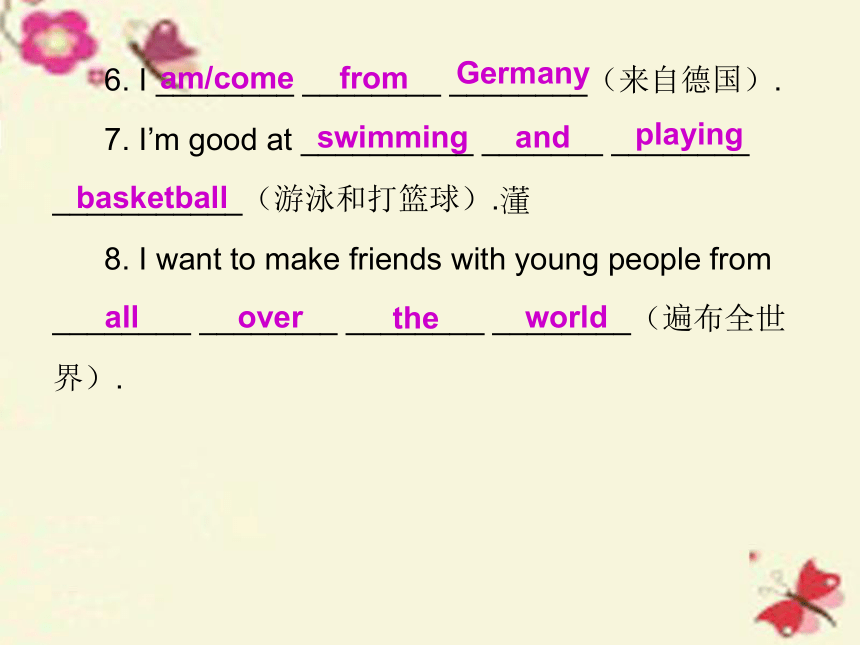
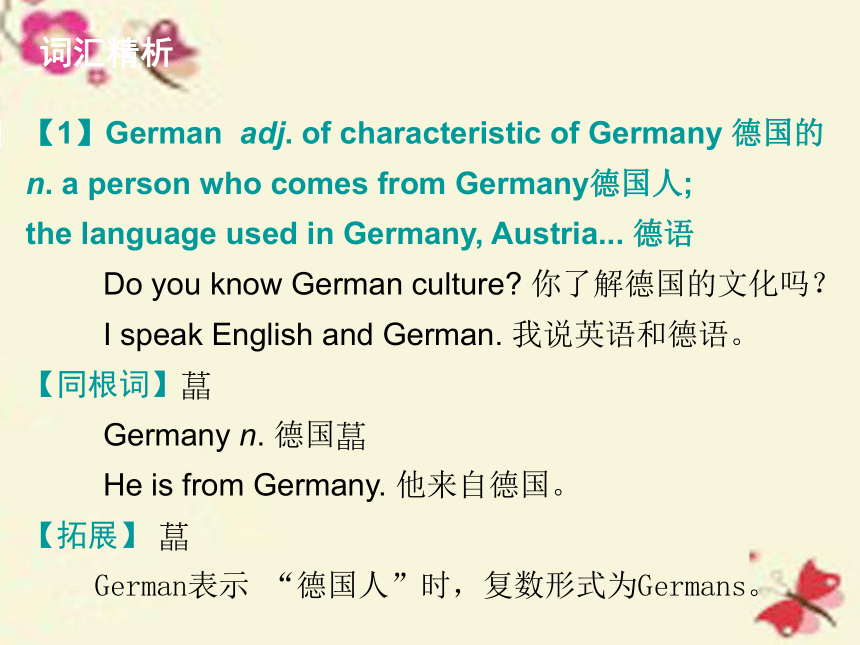
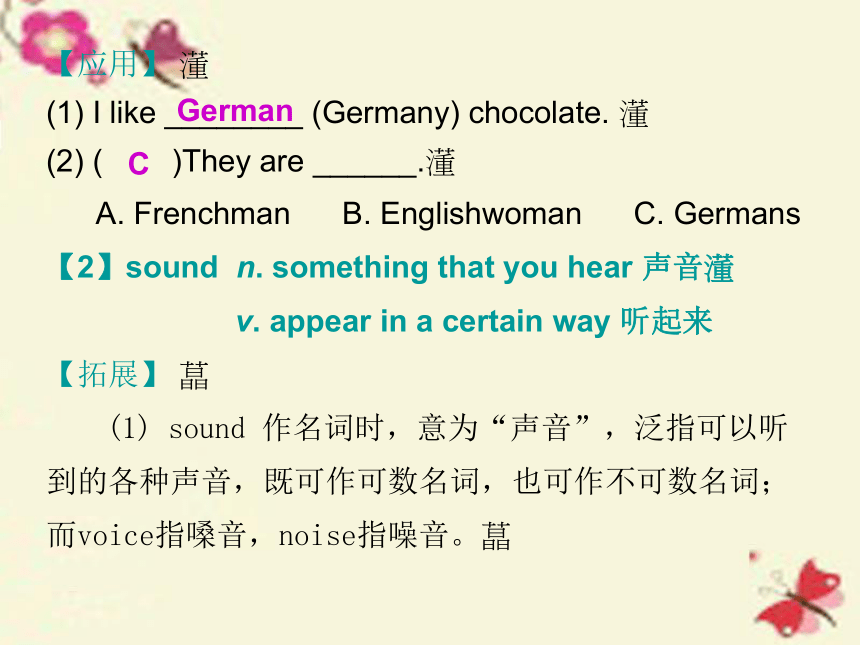
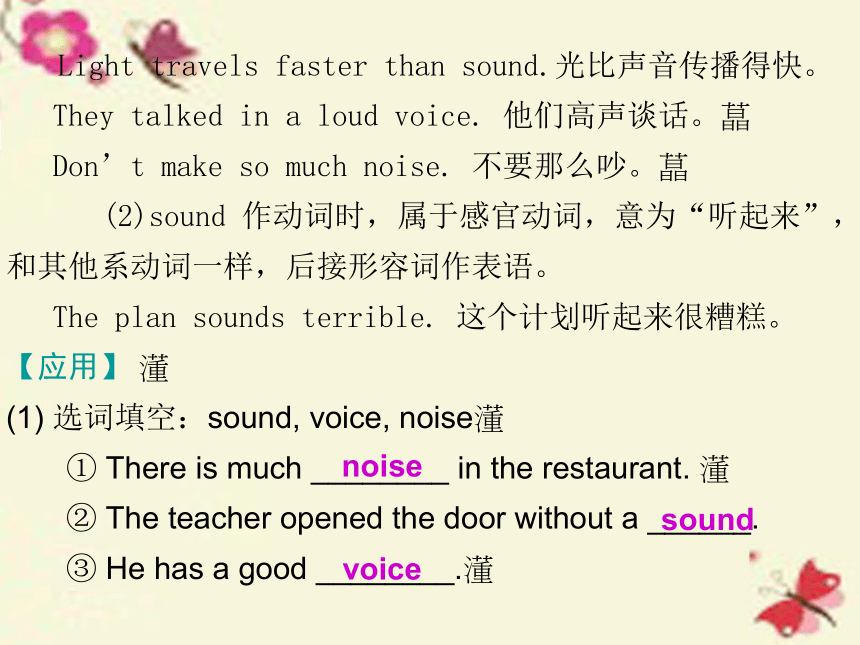
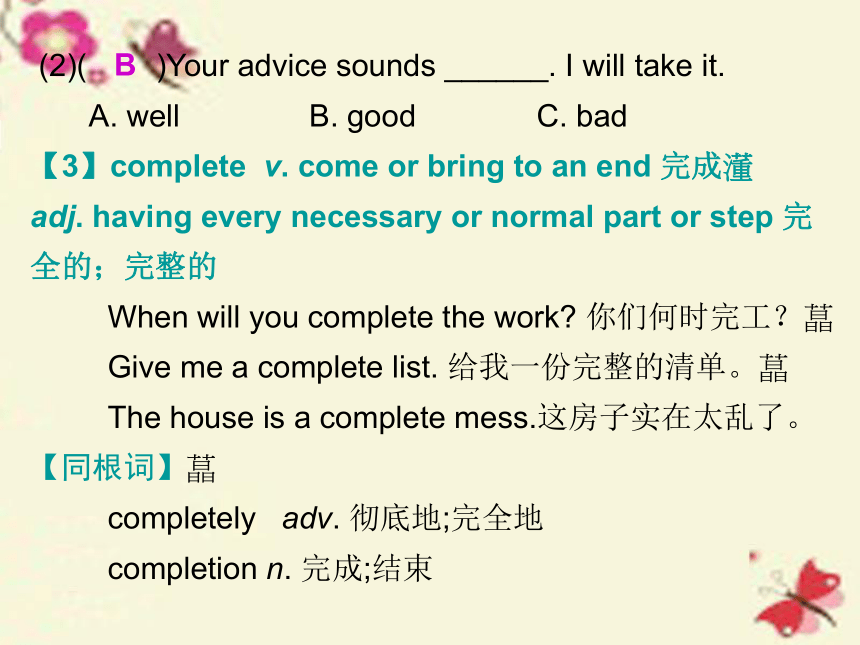
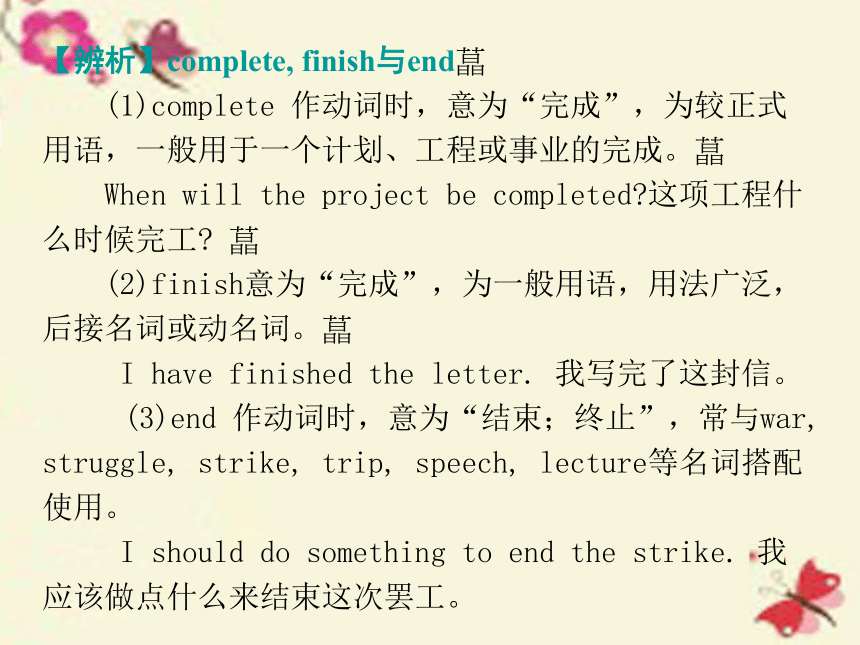
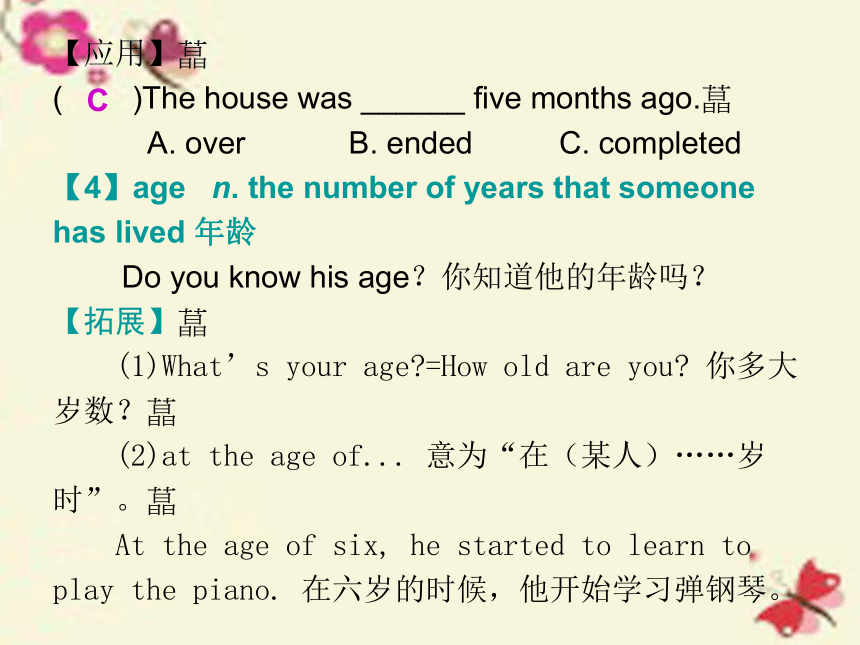
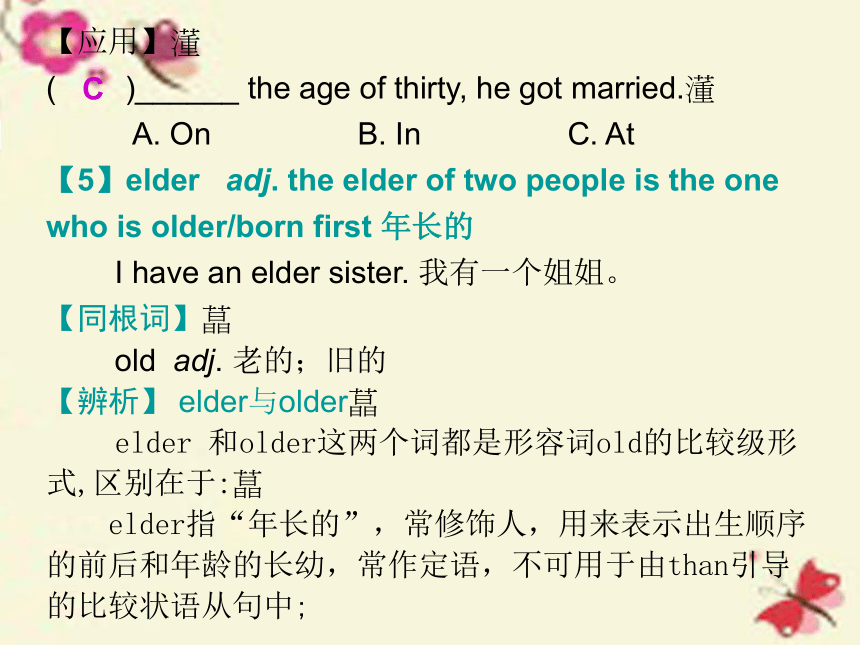
文档简介
课件32张PPT。Unit 1 Making friendsModule 1 My life自主预习一、根据汉语写出英文单词?
1. 爱好 (n.)_______________________
2. 声音 (n.) _______________________
3. 完成 (v.) _______________________
4. 梦想 (n.) _______________________ ?
5. 德国 (n.) _______________________
6. 友爱的;友好的 (adj.) ___________________?
7. 你自己 (pron.) _______________________
8. 年长的 (adj.) _______________________ ?
9. 年龄(n.)_______________________
10. 日本(n.)_______________________ ?
11. 语法(n.)_______________________
12. 工程师(n.)_______________________ ?hobbysoundcompletedreamGermanyfriendlyyourselfelderageJapangrammarengineer二、根据汉语写出下列词组?
1. 接近_________________________
2. 去上学_________________________
3. 擅长_________________________
4. 与……交朋友_________________________
5. 遍及_________________________
6. 愿意_________________________
7. 听音乐_________________________
8. 收到某人的来信_________________________close togo to schoolbe good atmake friends withall overwould/’d like tolisten to musichear from sb.三、根据汉语补全句子,每空一词?
1. I live with my family in a house ________ ________ ________ ___________(离一些山脉很近).
2. My dream is ________ ________ ________ ________ (成为一名工程师). ?
3. My school is ________ ________ ________ (离得很远) our home. ?
4. I________ ________ ________ ________ ________ (希望收到你的来信) soon.?
5. I have ______ ________ ________ (一个姐姐).?closetosomemountainstobeanengineerfarawayfromhopetohearfromyouaneldersister 6. I ________ ________ ________(来自德国).
7. I’m good at __________ _______ ________ ___________(游泳和打篮球).?
8. I want to make friends with young people from ________ ________ ________ ________(遍布全世界).am/comefromGermanyswimmingandplayingbasketballallovertheworld词汇精析【1】German adj. of characteristic of Germany 德国的
n. a person who comes from Germany德国人;
the language used in Germany, Austria... 德语
Do you know German culture? 你了解德国的文化吗?
I speak English and German. 我说英语和德语。
【同根词】?
Germany n. 德国?
He is from Germany. 他来自德国。
【拓展】 ?
German表示 “德国人”时,复数形式为Germans。 【应用】 ?
(1) I like ________ (Germany) chocolate. ?
(2) ( )They are ______.?
A. Frenchman B. Englishwoman C. Germans
【2】sound n. something that you hear 声音?
v. appear in a certain way 听起来
【拓展】 ?
(1) sound 作名词时,意为“声音”,泛指可以听到的各种声音,既可作可数名词,也可作不可数名词;而voice指嗓音,noise指噪音。?GermanC Light travels faster than sound.光比声音传播得快。
They talked in a loud voice. 他们高声谈话。?
Don’t make so much noise. 不要那么吵。?
(2)sound 作动词时,属于感官动词,意为“听起来”,和其他系动词一样,后接形容词作表语。
The plan sounds terrible. 这个计划听起来很糟糕。
【应用】 ?
(1) 选词填空:sound, voice, noise?
① There is much ________ in the restaurant. ?
② The teacher opened the door without a ______.
③ He has a good ________.?noisesoundvoice (2)( )Your advice sounds ______. I will take it.
A. well B. good C. bad
【3】complete v. come or bring to an end 完成?
adj. having every necessary or normal part or step 完全的;完整的
When will you complete the work? 你们何时完工??
Give me a complete list. 给我一份完整的清单。?
The house is a complete mess.这房子实在太乱了。
【同根词】?
completely adv. 彻底地;完全地
completion n. 完成;结束B【辨析】complete, finish与end?
(1)complete 作动词时,意为“完成”,为较正式用语,一般用于一个计划、工程或事业的完成。?
When will the project be completed?这项工程什么时候完工? ?
(2)finish意为“完成”,为一般用语,用法广泛,后接名词或动名词。?
I have finished the letter. 我写完了这封信。
(3)end 作动词时,意为“结束;终止”,常与war, struggle, strike, trip, speech, lecture等名词搭配使用。
I should do something to end the strike. 我应该做点什么来结束这次罢工。【应用】?
( )The house was ______ five months ago.?
A. over B. ended C. completed
【4】age n. the number of years that someone has lived 年龄
Do you know his age?你知道他的年龄吗?
【拓展】?
(1)What’s your age?=How old are you? 你多大岁数??
(2)at the age of... 意为“在(某人)……岁时”。?
At the age of six, he started to learn to play the piano. 在六岁的时候,他开始学习弹钢琴。C【应用】?
( )______ the age of thirty, he got married.?
A. On B. In C. At
【5】elder adj. the elder of two people is the one who is older/born first 年长的
I have an elder sister. 我有一个姐姐。
【同根词】?
old adj. 老的;旧的
【辨析】 elder与older?
elder 和older这两个词都是形容词old的比较级形式,区别在于:?
elder指“年长的”,常修饰人,用来表示出生顺序的前后和年龄的长幼,常作定语,不可用于由than引导的比较状语从句中; C older指“年纪较大的;较老的;较旧的”,修饰人或物,既可作定语,也可作表语,可用于由than引导的比较状语从句中。?
My elder sister gave me an apple. 我姐姐给了我一个苹果。?
I am four years older than my wife. 我比妻子大四岁。?
Your bag is older than mine. 你的包比我的旧。
【应用】 ?
( )My _____ brother is three years _____ than me.
A. older; older B. older; elder C. elder;olderC【6】friendly adj. behave in a pleasant, kind way, and like to be with other people 友好的;友善的
The people here are very friendly. 这里的人都很友好。
【同根词】?
friend n. 朋友 friendless adj. 没有朋友的
friendship n. 友谊?
A friend in need is a friend indeed. 患难见真情。
【拓展】 ?
(1)be friendly to sb.=be kind to sb.对某人友好?
He is friendly to me. 他对我友好。?
(2)unfriendly adj. 不友好的;有敌意的?
Why are you so unfriendly to him? 为什么你对他这 么不友善?【应用】 ?
(1)The waiter seemed very __________ (friend). I really liked her.?
(2)( )You should be friendly ______ your classmates.
A. to B. about C. with
【7】Japan n. a string of more than 3,000 islands east of Asia extending 1,300 miles between the Sea of Japan and the western Pacific Ocean 日本
He has been to Japan three times. 他去过日本三次。
【同根词】?
(1)Japanese adj. 日本的;日本人的 ?
He is the manager of that Japanese company. 他是那家日本公司的经理。?friendlyA (2)Japanese n. 日本人 ?
I met some Japanese. 我遇到了几个日本人。?
(3)Japanese n.日语?
My wife can speak Japanese. 我妻子会说日语。
注意:Japanese的复数还是Japanese,而German的复数是Germans。
【应用】?
( )There are five foreigners on the bus, two ______ and three ______.?
A. English;Germen
B. Australian;Japaneses
C. Germans;JapaneseC【8】11 years old 11岁
My younger sister is 11 years old.我妹妹11岁。
【拓展】?
数词+单数名词+形容词构成合成形容词,只作定语放在名词前,修饰名词。?
a twelve-year-old girl 一个12岁的女孩
【应用】?
(1)( )A _______ boy can sing the English song very well.?
A. five-years-old
B. five years old
C. five-year-oldC(2)( )Which of the following is wrong??
A. He is a fifteen-year-old boy.
B. He is at the age of 15.
C. He is fifteen-year-old.
【9】be good at=do well in 擅长
be good at=do well in,意为“擅长”,后接名词、代词或动名词。?
He is good at singing.=He does well in singing. 他擅长唱歌。
【拓展】 ?
(1)be good for... 对……有益的?
Vegetables are good for our health. 蔬菜对我们的健康有益。?C (2)be bad at不擅长?
She is bad at Physics. 她不擅长物理。
【应用】 ?
( )Mary is good ______ playing the piano while Lily does well ______ playing chess. ?
A. at; at B. at; in C. in; at
【10】would like to=want to do=feel like doing 愿意/想要做
would like to do=want to do=feel like doing 意为“愿意/想要做” ?
I would like to share my views with you.=I want to share my views with you.=I feel like sharing my views with you.我想和你分享我的想法。B【应用】 ?
(1)I would like __________ (have)some coffee. ?
(2)( )I want to go with you.(选出可以替换画线部分的最佳选项)?
A. would like to B. feel like C. wouldn’t like to
【11】hear from sb. =receive/get a letter from sb. 收到某人的来信
hear from sb.=receive/get a letter from sb., 意为“收到某人的来信”。?
I hear from my family twice a month.=I receive/
get a letter from my family twice a month. 我一个月收到两封家人的来信。to haveA【拓展】 ?
(1)hear of 听说?
Did you ever hear of such a man? 你曾经听说过这样一个人吗??
(2)hear about sb./sth.听到关于某人或某事的消息
I’ve just heard about his illness. 我刚听说他生病的事。
【应用】 ?
( )I heard from my penfriend yesterday.(选出可以替换画线部分的最佳选项)?
A. heard about B. heard of
C. received a letter fromC语法梳理语法精讲 一、疑问词
常见的疑问词如下:?
(1)what 什么(对做的事情或事物提问)?
What are you doing now? 你现在在做什么??
(2)which 哪一个(对选择的对象提问)?
Which one do you like better, the red one or the blue one? 哪个你更喜欢,红色的还是蓝色的??
(3)who 谁 (对人提问)?
Who is your elder sister? 谁是你姐姐??
(4)where 哪里 (对地点提问)?
Where are your books? 你的书在哪里? (5)when 什么时候 (对时间提问)?
When did you go home? 你何时回的家??
(6)how 怎样(对方式、方法等提问)?
How do you go to school every day? 你每天是怎么去学校的??
(7)how many 多少(对数量提问)?
How many students are there in your class?你们班有多少名学生??
(8)how much 多少(钱)(对价格提问)?
How much is the mobile phone?这部手机多少钱?
(9)how soon 多久 (对从某个基本时间开始到将来某动作结束或发生 (开始)的这段时间提问,常用在将来时态中,回答用“in+一段时间”)?
—How soon will you be back? 你多久将回来??
—In two days.两天以后。 (10)how long 多长时间 (对一段时间提问,回答用“for/about+一段时间”)?
—How long does it take you to finish your home-
work? 你花了多长时间来完成作业??
—For/About half an hour.大约半小时。?
(11)how often 多久(对频率提问)?
How often do you do sports?你多久做一次运动?
(12)how far 多远 (对距离提问)?
How far is your home from here? 你家离这里有多远?
(13)how old 多大 (对年龄提问)?
How old are you? 你多大? 二、不定冠词a、an的用法 ?
不定冠词有a和an两种形式,通常用在单数可数名词前。a用在以辅音音素开头的单词前, an用在以元音音素开头的单词前。注意:判断一个单词是以元音开头还是以辅音开头,是根据单词音标的第一个音素,而不是根据其首字母。 ?
不定冠词的主要用法包括:?
(1)表示数量“一”;?
There is a book on the desk. 桌上有一本书。 ?
(2)表示一类人或物;?
A child needs love. 孩子需要爱。?
(3)表示“某一个”的意思。?
A gentleman wants to see you. 有一位先生要见你。直击中考( )1. —______does your cousin usually go to work on foot??
—He says it’s good for his health. (2014重庆)?
A. Where B. When C. Why D. How?
( )2. I think English is______useful language, and it’s also______important language. (2014宜宾)
A. an; a B. a; an C. an; the D. a; the?
( )3. —Excuse me, Sir.______is it from here to the nearest shopping mall??
—Well, only about five minutes’ walk.(2014 湖州)
A. How often B. How long
C. How far D. How soonCCB写作乐园话题一 如何交朋友
【常用词组】?
1. be from 来自
2. by school bus 乘坐校车
3. be good at... 擅长……?
4. in one’s free time在某人空闲的时候
5. hear from sb.收到某人的来信?
6. make friends with... 与……交朋友
7. on the Internet在网上?【精彩句型】?
1. My dream is to be.../I want to be... 我想要成 为……?
2. How do you go to school/go to work?你如何去上学/去工作??
3. I’d like to... 我愿意/想要……?
4. Someone’s favourite sport/subject is... 某人最喜爱的运动/科目是……?
5. Someone enjoys doing... 某人喜欢做……【短文写作】?
假设你叫小华(Xiaohua),在网上看到一位名叫汤姆 (Tom)的男孩的信息,你很想与他交朋友。请就此写一封信给汤姆,向他介绍你的年龄、外貌、兴趣爱好、家庭成员、学校状况、你的理想等,并希望能尽快收到他的来信并与之成为好朋友。 ?
要求:语意连贯,条理清晰,信中不能出现真实的姓名和校名,60词左右。【范文赏析】?
Dear Tom,?
I’m so happy to get your information on the Internet today. I would like to be your e-friend. Now, I want to tell you something about myself.?
I’m Xiaohua. I am thirteen years old. My height is 150 centimetres tall. I have black hair and black eyes. I like playing basketball. I enjoy playing badminton, too.? There are four people in my family: my parents, my elder sister and me. My father is a Chinese teacher. My mother is a doctor. My sister and I are middle school students.?
I study in Grade Seven at No.2 Middle School. My favourite subject is English. I like my school very much. I would like to be a doctor in the future. I hope to hear from you soon and make friends with you.?
Yours,
Xiaohua 谢谢欣赏!
1. 爱好 (n.)_______________________
2. 声音 (n.) _______________________
3. 完成 (v.) _______________________
4. 梦想 (n.) _______________________ ?
5. 德国 (n.) _______________________
6. 友爱的;友好的 (adj.) ___________________?
7. 你自己 (pron.) _______________________
8. 年长的 (adj.) _______________________ ?
9. 年龄(n.)_______________________
10. 日本(n.)_______________________ ?
11. 语法(n.)_______________________
12. 工程师(n.)_______________________ ?hobbysoundcompletedreamGermanyfriendlyyourselfelderageJapangrammarengineer二、根据汉语写出下列词组?
1. 接近_________________________
2. 去上学_________________________
3. 擅长_________________________
4. 与……交朋友_________________________
5. 遍及_________________________
6. 愿意_________________________
7. 听音乐_________________________
8. 收到某人的来信_________________________close togo to schoolbe good atmake friends withall overwould/’d like tolisten to musichear from sb.三、根据汉语补全句子,每空一词?
1. I live with my family in a house ________ ________ ________ ___________(离一些山脉很近).
2. My dream is ________ ________ ________ ________ (成为一名工程师). ?
3. My school is ________ ________ ________ (离得很远) our home. ?
4. I________ ________ ________ ________ ________ (希望收到你的来信) soon.?
5. I have ______ ________ ________ (一个姐姐).?closetosomemountainstobeanengineerfarawayfromhopetohearfromyouaneldersister 6. I ________ ________ ________(来自德国).
7. I’m good at __________ _______ ________ ___________(游泳和打篮球).?
8. I want to make friends with young people from ________ ________ ________ ________(遍布全世界).am/comefromGermanyswimmingandplayingbasketballallovertheworld词汇精析【1】German adj. of characteristic of Germany 德国的
n. a person who comes from Germany德国人;
the language used in Germany, Austria... 德语
Do you know German culture? 你了解德国的文化吗?
I speak English and German. 我说英语和德语。
【同根词】?
Germany n. 德国?
He is from Germany. 他来自德国。
【拓展】 ?
German表示 “德国人”时,复数形式为Germans。 【应用】 ?
(1) I like ________ (Germany) chocolate. ?
(2) ( )They are ______.?
A. Frenchman B. Englishwoman C. Germans
【2】sound n. something that you hear 声音?
v. appear in a certain way 听起来
【拓展】 ?
(1) sound 作名词时,意为“声音”,泛指可以听到的各种声音,既可作可数名词,也可作不可数名词;而voice指嗓音,noise指噪音。?GermanC Light travels faster than sound.光比声音传播得快。
They talked in a loud voice. 他们高声谈话。?
Don’t make so much noise. 不要那么吵。?
(2)sound 作动词时,属于感官动词,意为“听起来”,和其他系动词一样,后接形容词作表语。
The plan sounds terrible. 这个计划听起来很糟糕。
【应用】 ?
(1) 选词填空:sound, voice, noise?
① There is much ________ in the restaurant. ?
② The teacher opened the door without a ______.
③ He has a good ________.?noisesoundvoice (2)( )Your advice sounds ______. I will take it.
A. well B. good C. bad
【3】complete v. come or bring to an end 完成?
adj. having every necessary or normal part or step 完全的;完整的
When will you complete the work? 你们何时完工??
Give me a complete list. 给我一份完整的清单。?
The house is a complete mess.这房子实在太乱了。
【同根词】?
completely adv. 彻底地;完全地
completion n. 完成;结束B【辨析】complete, finish与end?
(1)complete 作动词时,意为“完成”,为较正式用语,一般用于一个计划、工程或事业的完成。?
When will the project be completed?这项工程什么时候完工? ?
(2)finish意为“完成”,为一般用语,用法广泛,后接名词或动名词。?
I have finished the letter. 我写完了这封信。
(3)end 作动词时,意为“结束;终止”,常与war, struggle, strike, trip, speech, lecture等名词搭配使用。
I should do something to end the strike. 我应该做点什么来结束这次罢工。【应用】?
( )The house was ______ five months ago.?
A. over B. ended C. completed
【4】age n. the number of years that someone has lived 年龄
Do you know his age?你知道他的年龄吗?
【拓展】?
(1)What’s your age?=How old are you? 你多大岁数??
(2)at the age of... 意为“在(某人)……岁时”。?
At the age of six, he started to learn to play the piano. 在六岁的时候,他开始学习弹钢琴。C【应用】?
( )______ the age of thirty, he got married.?
A. On B. In C. At
【5】elder adj. the elder of two people is the one who is older/born first 年长的
I have an elder sister. 我有一个姐姐。
【同根词】?
old adj. 老的;旧的
【辨析】 elder与older?
elder 和older这两个词都是形容词old的比较级形式,区别在于:?
elder指“年长的”,常修饰人,用来表示出生顺序的前后和年龄的长幼,常作定语,不可用于由than引导的比较状语从句中; C older指“年纪较大的;较老的;较旧的”,修饰人或物,既可作定语,也可作表语,可用于由than引导的比较状语从句中。?
My elder sister gave me an apple. 我姐姐给了我一个苹果。?
I am four years older than my wife. 我比妻子大四岁。?
Your bag is older than mine. 你的包比我的旧。
【应用】 ?
( )My _____ brother is three years _____ than me.
A. older; older B. older; elder C. elder;olderC【6】friendly adj. behave in a pleasant, kind way, and like to be with other people 友好的;友善的
The people here are very friendly. 这里的人都很友好。
【同根词】?
friend n. 朋友 friendless adj. 没有朋友的
friendship n. 友谊?
A friend in need is a friend indeed. 患难见真情。
【拓展】 ?
(1)be friendly to sb.=be kind to sb.对某人友好?
He is friendly to me. 他对我友好。?
(2)unfriendly adj. 不友好的;有敌意的?
Why are you so unfriendly to him? 为什么你对他这 么不友善?【应用】 ?
(1)The waiter seemed very __________ (friend). I really liked her.?
(2)( )You should be friendly ______ your classmates.
A. to B. about C. with
【7】Japan n. a string of more than 3,000 islands east of Asia extending 1,300 miles between the Sea of Japan and the western Pacific Ocean 日本
He has been to Japan three times. 他去过日本三次。
【同根词】?
(1)Japanese adj. 日本的;日本人的 ?
He is the manager of that Japanese company. 他是那家日本公司的经理。?friendlyA (2)Japanese n. 日本人 ?
I met some Japanese. 我遇到了几个日本人。?
(3)Japanese n.日语?
My wife can speak Japanese. 我妻子会说日语。
注意:Japanese的复数还是Japanese,而German的复数是Germans。
【应用】?
( )There are five foreigners on the bus, two ______ and three ______.?
A. English;Germen
B. Australian;Japaneses
C. Germans;JapaneseC【8】11 years old 11岁
My younger sister is 11 years old.我妹妹11岁。
【拓展】?
数词+单数名词+形容词构成合成形容词,只作定语放在名词前,修饰名词。?
a twelve-year-old girl 一个12岁的女孩
【应用】?
(1)( )A _______ boy can sing the English song very well.?
A. five-years-old
B. five years old
C. five-year-oldC(2)( )Which of the following is wrong??
A. He is a fifteen-year-old boy.
B. He is at the age of 15.
C. He is fifteen-year-old.
【9】be good at=do well in 擅长
be good at=do well in,意为“擅长”,后接名词、代词或动名词。?
He is good at singing.=He does well in singing. 他擅长唱歌。
【拓展】 ?
(1)be good for... 对……有益的?
Vegetables are good for our health. 蔬菜对我们的健康有益。?C (2)be bad at不擅长?
She is bad at Physics. 她不擅长物理。
【应用】 ?
( )Mary is good ______ playing the piano while Lily does well ______ playing chess. ?
A. at; at B. at; in C. in; at
【10】would like to=want to do=feel like doing 愿意/想要做
would like to do=want to do=feel like doing 意为“愿意/想要做” ?
I would like to share my views with you.=I want to share my views with you.=I feel like sharing my views with you.我想和你分享我的想法。B【应用】 ?
(1)I would like __________ (have)some coffee. ?
(2)( )I want to go with you.(选出可以替换画线部分的最佳选项)?
A. would like to B. feel like C. wouldn’t like to
【11】hear from sb. =receive/get a letter from sb. 收到某人的来信
hear from sb.=receive/get a letter from sb., 意为“收到某人的来信”。?
I hear from my family twice a month.=I receive/
get a letter from my family twice a month. 我一个月收到两封家人的来信。to haveA【拓展】 ?
(1)hear of 听说?
Did you ever hear of such a man? 你曾经听说过这样一个人吗??
(2)hear about sb./sth.听到关于某人或某事的消息
I’ve just heard about his illness. 我刚听说他生病的事。
【应用】 ?
( )I heard from my penfriend yesterday.(选出可以替换画线部分的最佳选项)?
A. heard about B. heard of
C. received a letter fromC语法梳理语法精讲 一、疑问词
常见的疑问词如下:?
(1)what 什么(对做的事情或事物提问)?
What are you doing now? 你现在在做什么??
(2)which 哪一个(对选择的对象提问)?
Which one do you like better, the red one or the blue one? 哪个你更喜欢,红色的还是蓝色的??
(3)who 谁 (对人提问)?
Who is your elder sister? 谁是你姐姐??
(4)where 哪里 (对地点提问)?
Where are your books? 你的书在哪里? (5)when 什么时候 (对时间提问)?
When did you go home? 你何时回的家??
(6)how 怎样(对方式、方法等提问)?
How do you go to school every day? 你每天是怎么去学校的??
(7)how many 多少(对数量提问)?
How many students are there in your class?你们班有多少名学生??
(8)how much 多少(钱)(对价格提问)?
How much is the mobile phone?这部手机多少钱?
(9)how soon 多久 (对从某个基本时间开始到将来某动作结束或发生 (开始)的这段时间提问,常用在将来时态中,回答用“in+一段时间”)?
—How soon will you be back? 你多久将回来??
—In two days.两天以后。 (10)how long 多长时间 (对一段时间提问,回答用“for/about+一段时间”)?
—How long does it take you to finish your home-
work? 你花了多长时间来完成作业??
—For/About half an hour.大约半小时。?
(11)how often 多久(对频率提问)?
How often do you do sports?你多久做一次运动?
(12)how far 多远 (对距离提问)?
How far is your home from here? 你家离这里有多远?
(13)how old 多大 (对年龄提问)?
How old are you? 你多大? 二、不定冠词a、an的用法 ?
不定冠词有a和an两种形式,通常用在单数可数名词前。a用在以辅音音素开头的单词前, an用在以元音音素开头的单词前。注意:判断一个单词是以元音开头还是以辅音开头,是根据单词音标的第一个音素,而不是根据其首字母。 ?
不定冠词的主要用法包括:?
(1)表示数量“一”;?
There is a book on the desk. 桌上有一本书。 ?
(2)表示一类人或物;?
A child needs love. 孩子需要爱。?
(3)表示“某一个”的意思。?
A gentleman wants to see you. 有一位先生要见你。直击中考( )1. —______does your cousin usually go to work on foot??
—He says it’s good for his health. (2014重庆)?
A. Where B. When C. Why D. How?
( )2. I think English is______useful language, and it’s also______important language. (2014宜宾)
A. an; a B. a; an C. an; the D. a; the?
( )3. —Excuse me, Sir.______is it from here to the nearest shopping mall??
—Well, only about five minutes’ walk.(2014 湖州)
A. How often B. How long
C. How far D. How soonCCB写作乐园话题一 如何交朋友
【常用词组】?
1. be from 来自
2. by school bus 乘坐校车
3. be good at... 擅长……?
4. in one’s free time在某人空闲的时候
5. hear from sb.收到某人的来信?
6. make friends with... 与……交朋友
7. on the Internet在网上?【精彩句型】?
1. My dream is to be.../I want to be... 我想要成 为……?
2. How do you go to school/go to work?你如何去上学/去工作??
3. I’d like to... 我愿意/想要……?
4. Someone’s favourite sport/subject is... 某人最喜爱的运动/科目是……?
5. Someone enjoys doing... 某人喜欢做……【短文写作】?
假设你叫小华(Xiaohua),在网上看到一位名叫汤姆 (Tom)的男孩的信息,你很想与他交朋友。请就此写一封信给汤姆,向他介绍你的年龄、外貌、兴趣爱好、家庭成员、学校状况、你的理想等,并希望能尽快收到他的来信并与之成为好朋友。 ?
要求:语意连贯,条理清晰,信中不能出现真实的姓名和校名,60词左右。【范文赏析】?
Dear Tom,?
I’m so happy to get your information on the Internet today. I would like to be your e-friend. Now, I want to tell you something about myself.?
I’m Xiaohua. I am thirteen years old. My height is 150 centimetres tall. I have black hair and black eyes. I like playing basketball. I enjoy playing badminton, too.? There are four people in my family: my parents, my elder sister and me. My father is a Chinese teacher. My mother is a doctor. My sister and I are middle school students.?
I study in Grade Seven at No.2 Middle School. My favourite subject is English. I like my school very much. I would like to be a doctor in the future. I hope to hear from you soon and make friends with you.?
Yours,
Xiaohua 谢谢欣赏!
